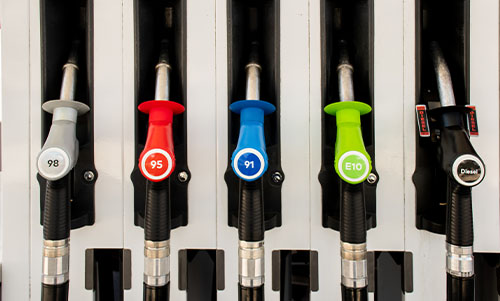Petrol vs Diesel: which should you buy

Should I get a petrol or a diesel car: a question that has burned on for quite some time in the motoring domain.
Today, that question is possibly more pressing than ever, thanks largely to new legislation and the changing views around the cleanness of diesel cars.
To clear some points up, we dig deep into the subject and shed some light on the current debate on whether you should buy a petrol or diesel car.
Petrol vs diesel: where will you drive your car?
There has always been some chatter about why you should drive a diesel or petrol-powered car based on how and where you drive it – and there is usually some truth behind it.
The roads and circumstances of your driving are possibly the first steps on whether you should buy a diesel or petrol car, because one of the two will always be better suited on one road compared to another.
A-roads & B-roads: this is where a petrol-powered car will excel. Petrol engines don’t require you to run at certain speeds to have car perform optimally; your petrol car’s efficiency can be effective at most speeds. Meanwhile, the way in which a petrol engine works and performs makes it better suited to the stop-start nature of city and rural roads.
Motorway driving: diesel cars come into their element on these high-speed roads. Whilst on A-roads or smaller, diesel cars struggle to run at optimum efficiency, but on a motorway, it can stretch its legs and get to a point in its running gear where peak MPG is achieved.
In addition to the above, diesel cars use something called a Diesel Particulate Filter (DPF), which have been a legal requirement on all diesel cars since 2009. The DPF is there to remove excess soot that gets built up as fuel is burned through the engine’s system.
It is important to know – and this could be the kicker – that this process can only happen efficiently if the diesel engine is running at high speed for between 30 and 50 minutes, which gets the exhaust temperature to level it needs to be at to burn away this soot.
So, if you’re wondering between petrol or diesel for short journeys, this may have already answered your question. However, if you’re a motorway regular, it could be that diesel is the way to go in this instance.
Petrol vs diesel: which one is cheaper to live with?
A few years ago, this might have been an easier question to answer; however, with improved technology and new legislation, the lines are slightly blurred on which is actually the cheaper choice, but we’ll do our best to explain the situation.
Cost of the car: first and foremost, you’ll be wondering which is cheaper to buy, which is likely the easiest part of this to clear up. Diesel cars, in the grand scheme of things, will always be more expensive to buy than their petrol counterparts, usually by anything up to £2,500.
On that basis, this expense will be relative to what car you’re looking at. In the case of a well-priced supermini, this extra cost can represent a 25 per cent increase of the car’s value over the petrol equivalent, but £2,500 on top of a £40,000 executive saloon might not feel so bad.
If you’re wondering why this extra expense exists, it’s largely down to the additional technology required to help diesel cars get through emissions tests.
Insurance: because of the increased cost of the technology that keep diesels efficient, repair costs are also increased where engine and exhaust components are concerned. This then leads into insurance costs, which are also generally higher than petrol cars due to this additional expense.
Car tax: or Vehicle Exercise Duty – is where it gets a little more complicated. For cars registered pre-April 2017, both petrol and diesel vehicles avoid VED charges if their emissions dip below 100g/km of CO2. However, after this time, only zero-emission cars are able to take advantage of this, with a standard £140 charge coming in for most cars – petrol or diesel – if priced under £40,000.
Then, in April 2018, an additional charge came in for diesels registered on or after this date which don’t meet Euro 6 regulations and conditions. This charge will depend upon which car you are looking at and the amount could range from as little as £20 to over £400 based on emissions, so it will be important to see where your vehicle of interest ranks in this case.
Economy: now this is where diesels generally come into their own but, as previously mentioned, the lines are being blurred slightly here by petrol engines improving fast on both emissions and economy figures.
Generally speaking, you will be most likely to get more miles from the same amount of fuel in a diesel than a petrol car (when driven in the correct circumstances). So, despite the cost of diesel being more expensive at the pump, this cost will pay out over time through enhanced MPG over a petrol. Though, the gap is getting smaller by the year.
Servicing: while petrol cars need servicing more regularly, their parts tend to be much cheaper, while diesel cars require, as already touched upon, more complex components, making a service more expensive. Replacing the DPF, for example, can be costly, while additional factors such as diesels requiring AdBlue can also up the price.
Residuals: another complex part of car ownership. Given the uncertainty over the future of diesel and the used car market in general, this can make estimating their value when selling a bit tricky. However, for now, in most cases, a diesel should make for a better return than a petrol counterpart.
Petrol vs diesel: is there much difference in performance?
If you care about how your car drives, this will be a vital step in deciding on whether you should buy a diesel or petrol car.
Performance is generally smoother when driving a petrol-powered car, largely down to the responsiveness of the engine and its ability rev freely. You’ll also be able to enjoy a broader torque curve, giving you peak torque for more of the rev range.
Diesel cars are also known for their torque levels, which arrive much earlier in the rev range than most petrols and can make it easier for overtakes on the motorway when doing low revs. However, this torque band is usually much shorter lived than a petrol’s, making diesels not very good at high revs in low gears.
So, a diesel isn’t a car you would naturally choose for performance, but some have been designed with a more sporting nature in mind – you just have to spend a bit more to get one.
In regards to choosing a manual or automatic, petrols are certainly better suited to the former thanks to their ability to be a bit sportier in driving style, while a diesel is much more laid back in the way it needs to be driven, so an auto transmission is usually the best option.
Petrol vs diesel: looking to the future
It’s already evident that diesels are being looked at with more scrutiny, with proposed banning of diesel vehicles mooted for the future in major cities across the UK, not to mention the proposed expulsion of any conventional combustion engine from 2040.
Clean Air Zones (CAZs) look to be the first thing to affect cars in cities, with Birmingham, Nottingham and Leeds among a few who, in 2019, will look to implement such areas where cars can be charged a fee if their vehicle does not meet strict environmental standards.
A government-backed plan is also in the works to offer incentives for people to trade in pre-Euro 6 diesel cars for more efficient, cleaner vehicles. Meanwhile, the likes of increased parking charges (both public and residential) for diesel cars is in the mix.
Despite the cut in the government grant to do so, it’s evident enough that the focus is on making hybrid and fully-electric cars peoples’ next vehicles of choice. As such, the next few years will see this argument of fuel choice expand into other areas, and it might be that petrol vs diesel becomes a thing of the past.
Blog Comments
To view, comment or reply to comments you must be logged into facebook



